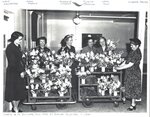







During Ridgefield Heritage Society’s second annual Pioneering Women of Ridgefield presentation on March 27, three new influential individuals and two groups were recognized for their contributions to the city.
Heritage Society seeks five women or women-led groups each year to research and present during Women’s History Month in March.
Charlotte Clevidence Dynes
Charlotte Dynes, known locally for her volunteerism and school-bus driving, was nominated as one of the pioneering women of Ridgefield for 2024. She attended the presentation, given by Heritage Society member Belle Mathieu.
Dynes was born in 1939 in Michigan. She was the youngest of six children and lovingly nicknamed “Shotsie” by her parents, Mathieu said. Her family moved to Washington in 1945 for her father’s work and settled in Ridgefield.
Dynes became a bus driver for the Ridgefield School District in 1973. She spent 34 years transporting children, and many locals remember her daily drives, Mathieu said.
“Charlotte’s contributions to our community have not only been through the relationships she created with so many Ridgefield families as a bus driver, but all the work she contributed to various organizations,” Mathieu said.
Dynes is known for contributing to many historical projects within Ridgefield, Mathieu said. She founded the Ridgefield Heritage Society in 2022. She also contributed to Allene Wodaege’s “Ridgefield Reflections: A Legacy” history book alongside Kay Hawkins Douglass, Tim Thompson and Dan Kallem.
Bernice Lorang Bartel
Bernice Bartel was noted for her medical contributions and volunteerism in Ridgefield. Bartel was born in Idaho in 1923 and moved to Ridgefield to join her husband, Bill, in 1946 to help him run their farm. With an education in nursing, Bartel aided many Ridgefield residents with medical care, from stitching to providing medications.
Adapting to farm life was difficult for Bartel, who had never grown up around livestock. However, she soon became fast friends with the farm animals, and she was the only one the bull trusted, according to presenter Linda Henick.
Bartel and her husband contributed to the community in a variety of ways. Together, they founded the Fair Task League in the 1960s. They served as grand marshals for the Ridgefield Fourth of July parade. The Bartels also campaigned heavily for Washington Gov. Dan Evans, Henick said.
Florence Dorothea Noffz Stryker
Florence Stryker, known for founding the Ridgefield Garden Club, was likewise acknowledged as a pioneering woman of Ridgefield. Born to a large family in Wisconsin, she came to Ridgefield in her early 30s after marrying her husband, Ralph. Together, they planted a large French-style garden, where travelers and the infirm could work for food, shelter and medical care.
Stryker was well-known for her community contributions as a founding member of the Ridgefield Garden Club in 1938, assistant founder for the Ridgefield Cub Scouts and Rainbow Girls adviser, presenter Beth Boyle said.
The Dr. Ralph and Florence Stryker House at 207 S. Third Ave., Ridgefield, is currently being remodeled to more accurately match the French gardens the Strykers once tended, Mathieu said.
Ridgefield Garden Club
The Ridgefield Garden Club was founded in 1938 by a group of 15 women as a social and gardening group. Originally an exclusive, invite-only club, it is now available to the public.
The lot for Davis Park on North Third Avenue was going to be the location for a clubhouse. Realizing what a major undertaking the project would be, the garden club donated the land to the city and created Davis Park in 1963.
The garden club is also responsible for many beautification projects around Ridgefield. Many park benches were created by the club. The garden boxes along Pioneer Street are also planted and maintained by the club.
For more information about Ridgefield Garden Club, visit ridgefieldgardeners.org.
American Women’s League and chapter house
Ridgefield once hosted a rare American Woman’s League chapter house. The chapter house, built in 1910 along First Avenue, played a pivotal role in women’s suffrage by providing education, Mathieu said.
The American Woman’s League encouraged women across the country to vote and educate themselves. Magazines, containing educational material and instructions on how to study, were sent to members.
Membership was obtained through a $52 monetary donation or by selling $52 worth of American Women’s League magazines within the community, Mathieu said.
The chapter house in Ridgefield cost $1,200 to build, and the American Woman’s League provided all building materials and furnishings. The Ridgefield chapter house was one of the 39 built across the country and opened with 30 members.
The chapter house was registered on the National Registry of Historical Places in 1982 but was demolished without permission in 1990. The remnants of the building, such as the windows and timber, were incorporated into nearby homes, Mathieu said.
For more information about the Ridgefield Heritage Society, visit ridgefieldheritagesociety.com. To submit nominations for next year’s Pioneering Women of Ridgefield, email Contact@RidgefieldHeri tageSociety.com.